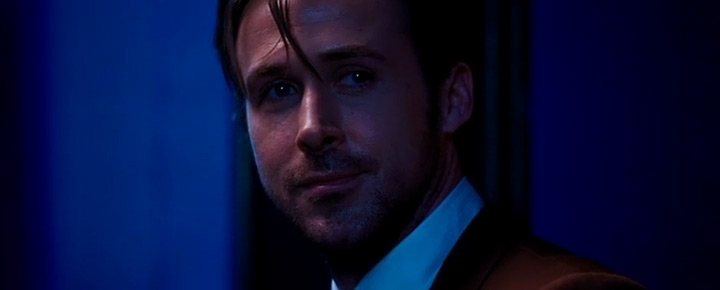This is an enjoyable and finely made film that revives the musical genre with its addictive song. The lingering cognitive dissonance it produces, however, proves to be just too much to ignore.xxxxxxxxxxxxxxxxxxxxxxxxxxxxxxxxxxxxxxxxxxxxxxxxxxxxxxxxxxxxxxxxxxxxxxxxxxxxxxxxxxxxxxxxxxxxxxxxxxxxxxxxxxxxxxxxxxxxxxxxxxxxxxxxxxxxxxxxxxxxxxxxxxxxxxxxxxxxxxxxxxxxxxxxxxxxxxxxxxxxxxxxxxxxxxxxxxxxxxxxxxxxxxxxxxxxxxxxxxxxxxxxxxxxxxxxxxxxxxxxxxxxxxxxxxxxxxxxxxxxxxxxxxxxxxxxxxxxxxxxxxxxxxxxxxxxxxxxxxxx
I think about that day
I left him at the Greyhound station
West of Santa Fé
We were seventeen, but he was sweet and it was true
Still I did what I had to do
It will probably be some weeks or even months before you will be able to get the music of La La Land out of your mind. This film really has it all: wonderful music, phenomenal acting, a crisp HD-cinematic aesthetic, cool characters, parties, romance, Hollywood dreams--the film really is the most complete complement of desiring cinematic elements to have made it to the screen in recent memory. The film is also remarkably well made, its narrative is perfectly matched with its emotional tone, the music is perfectly performed, even by the actors themselves, and the story is a nice, pleasant, uplifting one that has depth. It makes one really understand what it is about musicals that were once such a dominant production of Hollywood in its Golden Age. In that sense, the director, Damien Chazelle, accomplishes no small feat in making the stale and generally dated genre once again relevant while at the same time making its inner logic of song and narrative comprehensible to a contemporary audience whose senses may not be familiar with the joys of it. It is as if, just as in the opening scene of the film, the gray reality of ordinary life suddenly bursts forth with the song of Hollywood glamour and dreams once again. This is the best that the cinema can achieve.
Unfortunately, though, there is a problem with La La Land, one apparent to the careful listener already in the opening scene of the film1. Watching the film, one is reminded of the line in the Coen brother's Hail, Caesar! where a group of communists are talking about how they always have such a smooth way of putting their message into movies that it is almost undetectable yet incredibly effective. Unlike Whiplash (the director's first film), which is saturated with a liberal argument at nearly every moment, in this film liberal ideology only really finds direct expression in a few places and manifests itself as a subtle form of emotional-rational dissonance.
The point that this film seems to make is, essentially, that individual dreams and aspirations are more important, or can be more important than love. It tells us that one can force their passions into conformity with their rational plans and that it is logically consistent and leads to a stable, tenable existence. The dissonance at the end of the film is a result of the fact that the romantic ideal has been transgressed in favor of a liberal, materialistic concept of success. The loss of a true love relationship that might undermine 'living the dream' and achieving independent success is transformed into the reason for achieving that success. It seems that to look back with regret on this lost love would be only to contaminate each's achievement, that an act of suppression is embedded in this ending as well (which is probably why an initially somber glance is positively refused in the glowing smile it forcibly becomes).
The fact is that the romantic idea that love transcends all else seems to no longer apply to modern life and it exigencies. Just like Steve Jobs says in Sorkin's Jobs: 'I didn't think it was possible to choose to not love someone, but it turns out you can.' The concept of love seems to be losing ground to a liberal ideology who's allure is stronger than it and who's benefits also appear to be more worthwhile than a single relationship and whatever possibilities for domesticity and self-expression/development it might afford over and against the potential for global influence and the reach of one person's networks that they might create in defiance of love: the billion dollar yacht's, sailing the world, sequestering oneself into the isolation of their own creation (e.g., Deus Ex Machina). The dreams that are possible through one's application of a liberal ideology in their life are bigger and better (and fundamentally more moral) than those of romantic love.
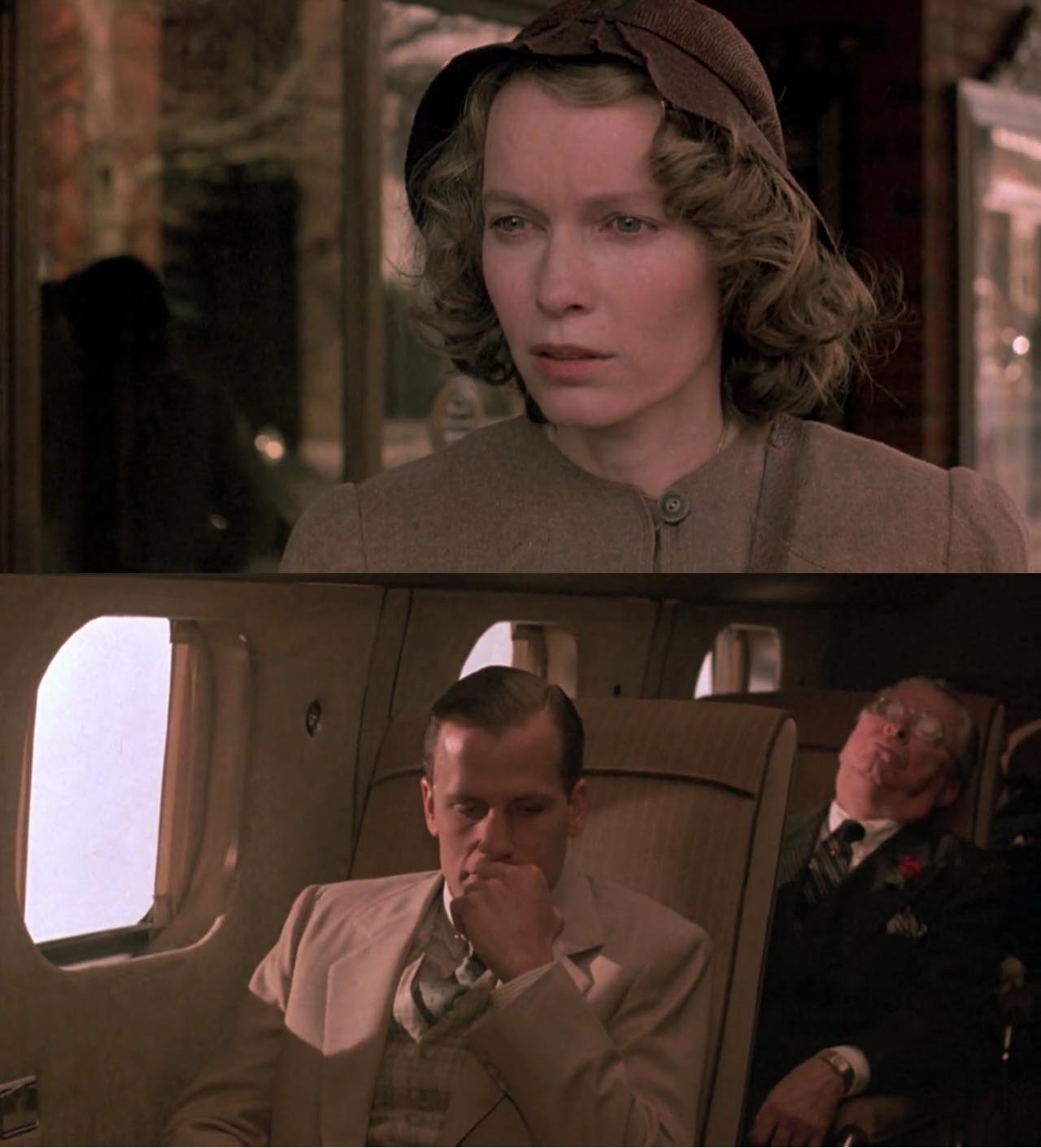
This is an entirely other perspective on dreams than what one finds in the Woody Allen's films: that dreams are never fully realizable; rather, dreams are what they are because of the reality that remains inescapable and from within which the dream attains its significance as a dream. In The Purple Rose of Cairo, dreams are ephemeral, illusory and misleading. Dreams are what they are here not because they represent some realizable aspiration, but on account of their ever-shifting, always unattainable allure, one that persists despite that life doesn't live up to them.
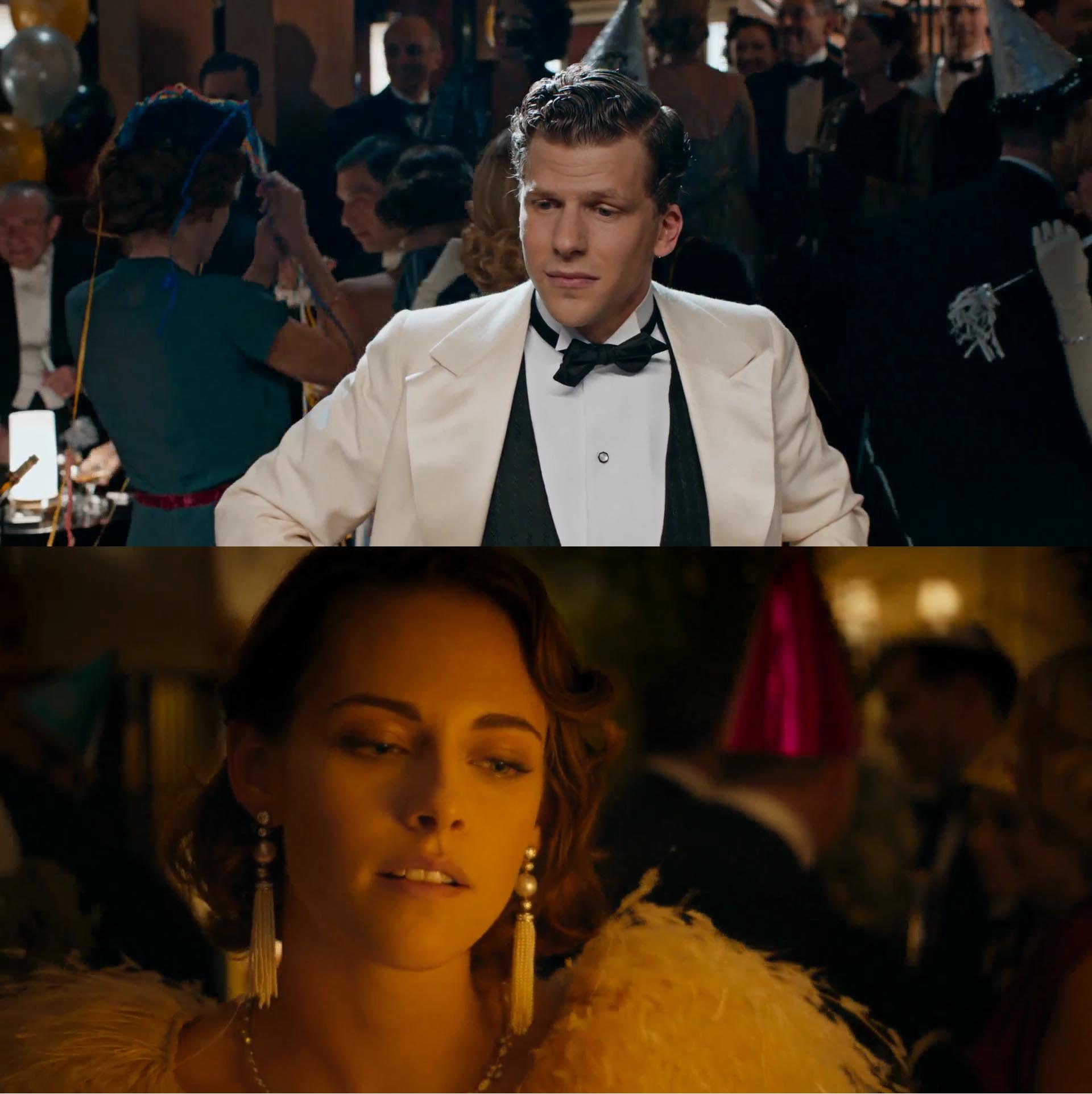
Likewise, the alienating dreams of Cafe Society are also such counter-intuitive dreams. In that film, while both Eisenberg and Stewart's characters achieve their independent versions of success--what should have been their dreams (each in both L.A. and New York respectively)--these dreams and the pursuit of them are also what come to separate them. Having followed their 'dreams' to their natural conclusions, independently of one-another, the dreams of material affluence, social vibrancy, and of a glamorous Hollywood lifestyle reveal themselves to be nothing more than hollow realities that have lost their dream-like allure.
In this way, the dreams Woody Allen reveals to us are superficial dreams, dream-illusions that become hollow realities undermined by an emotional, romantic reality that turns out to have been more important than them. These are dreams which are always changing and in flux and that relate to life in a romantic way through that which one lacks or has lost.
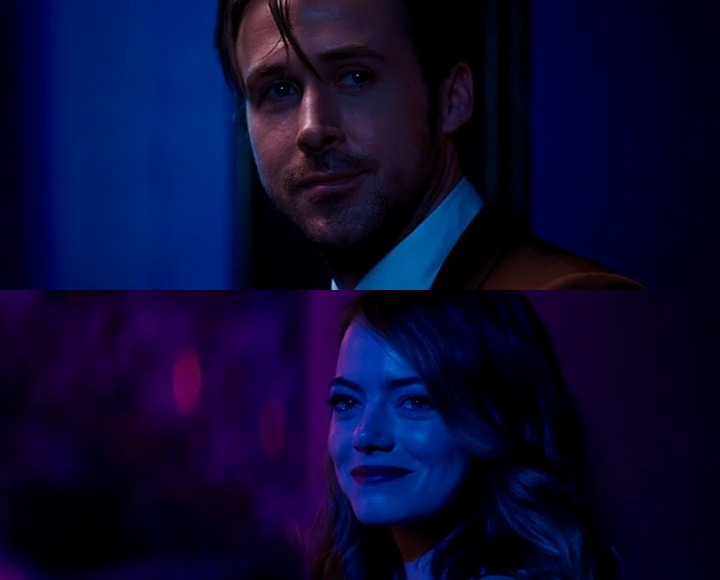
In contrast to these kinds of dreams, Gosling's tortured smile in the final moments of La La Land prevent its version of dreams from being undermined in any way: both characters are fully authorized to have made the choices they made and arrived at the places they arrived at. This is the refusal to acknowledge the reality of romantic love lost for the sake of making the dreams of success fully realized through force of manufactured ignorance of the reality of their past love. This is the kind of dream that basically says that anything one desires is validated 100%. Any potentially negative side-effect that arises as a result of one's pursuit of their dreams can be negated by the fact that each person is responsible for their own dream at bottom and that it's only up to each person to take from life what they want. Certainly, the idea that Gosling's character wouldn't start his Jazz club, would end up destitute can't even enter into this kind of perspective on dreams. As in Whiplash, were such a situation to arise, it would have to be portrayed as being the failure of an individual to live up to their potential. One can imagine the same ending where Stone's character looks at Gosling's lying in a pile of garbage and just shakes her head at what a letdown to her and his dreams he became before racing off in her Mercedes. That this doesn't happen, that the film makes the both of them a success on their own terms avoids this obvious problem. In this case no one person has lost anything so what they have lost together can be overlooked on account of individual gain. In this way, the film authorizes one to be just whatever kind of person one wants to be, just so long as it is done in the service of dreams and talent. In La La Land the divisions and sacrifice of love are reasons that the dream became what it became rather than pure sacrifices, which is what they should be if any fidelity to the past love is to be maintained2. This is a fetishistic dream, one that is permanent and endures no matter what the cost and the disavowal necessary: it is the concept of 'dream' turned into a schizophrenic nightmare through its insistence to be made real.
What we see in La La Land is the emergence in popular cultural production3 of the liberal dream itself and the success possible through it that has reached a point of valuing itself more than anything else: of love, of human morals and ethics, of logical contradictions, of the notion that the dream generally produces its opposite (dejection, loss impoverishment, moral vacuity etc). It is the liberal dream expressing itself in the full regalia of the nostalgia of Hollywood's past. In this most subtle of ways, the film transposes logical thought onto a new emotional basis through the deft act of denying the actual emotional logic of such situations in favor of a new concept of how one could, hypothetically feel that derives its emotional sensibility from the glitz and glamour of the film itself. It is the film and its allure that provides the basis for any feeling of contentment with its conclusion rather than as a result of the actions represented in it mirroring any emotional reality of its audience.
In this way, the film replaces what one might consider to be the basic human morality of dreams with a corrosive, sociopathic logic of dreams that authorizes one to make any and all cuts and deliberate denials of emotional and social bonds according to erroneous faux-romantic idea that dreams themselves are fully realizable. The film is an elaborate, alluring dishonesty that, by imitating the romance and musical genres attempts to invest a false liberal ideology with the emotional significance and truth those genres and the emotions associated with them have historically had.
To conclude, one could say that if the notion of romantic love has been the source of centuries of suffering under the weight of an ideal that subjects one to the vagaries of the random chance and the serendipity of occurrence that is its basic radically contingent 'logic', then La La Land expresses a kind of a-romantic rationality of dreams that are fully achievable in life according to our own decisions and ability to make tough choices that has the effect of transforming such suffering into self-flagellation4. No longer can one blame life and luck for their failure to realize their dreams, the issue is entirely displaced into a new logic according to which any failures are the result of an inability to make the kinds of radical, sociopathic decisions that the contemporary cut-throat context requires. Ambition and aspiration are conflated with dreams and romance, the dissonance of which is then obfuscated through the application of all the possibilities for producing desire that the cinema has in order to produce a partial (and false sense of) stability and truth. Whether intentional or not, it is this that constitutes the function of the film as propaganda5.
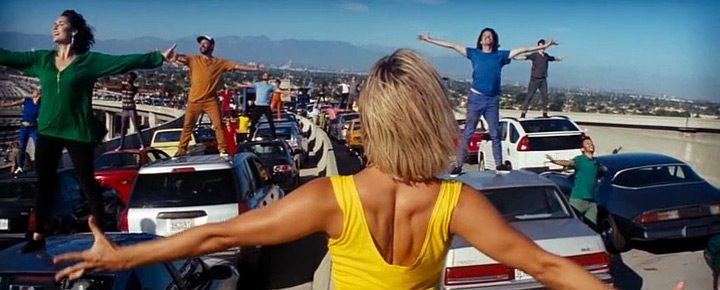
(i.e., this music might make the grind of another day of gridlock traffic seem more tolerable for about five minutes; however, the reality of the political and economic context that produces a dysfunctional public transit system and the proliferation of precarious low-wage New Economy labor that sits stuck on the Interstate 15-minutes from being fired for no-cause will persist long after the music fades from memory.)
Footnotes
In the opening song, if one pays close attention to the seemingly contradictory message of the words themselves over and against the emotional response generated by the performance of them. ↩
According to Badiou, love functions according to the 'logic of event'. For, how can we ever say that we truly loved someone that we left to pursue some other, worldly, material gain? Is it not the case that real love is such a thing that leaves a mark in our lives, is something that we never truly get over and that, when confronted with a past love, paying real respect to that love isn't to retrospectively drain it of its truth in order to justify what happened later. It is all a matter of perspective in that sense, whether we choose to look at the past with respect to the love that we lost (so it appears as loss) or from the perspective of what we have gained (from which it appears as basis and justification). ↩
This is the theme of both Scorcese's Wolf of Wall Street and also the recent Gold. In the former, Scorcese's point is to show how the power of the liberal American dream persists despite seeing the inherent contradictions upon which it is based (the destitute on the subway, the desperate in some self-help marketing seminar teaching them how to make their life better, and the destruction in the wake of the 2008 Financial Crisis that was based on fraud); in the latter, the film, in a somewhat High School sophomoric way, creates a conclusion in which is it unclear whether or not McConaughey's character was aware of the fraud he engaged in with his partner and whether or not we are to believe this was all part of the informal agreement signed on the back of a napkin in the Indonesian jungle or whether or not he too was subject to an elaborate fraud that is only later rendered fair to him through his former partner's honesty in honoring that agreement: the point made is that, at this final moment of discovery, one asks themselves whether or not the end (the huge hundreds of million dollar check) justifies the means regardless of which is the truth, i.e., does the allure of gold in fact trump either scenarios moral or ethical critique on account of its allure which in fact is the basic message on its allure, i.e., that it does have such an effect of rendering these contradictions as secondary. This is also the allure of The Founder, where Michael Keaton works to legitimize the absolutely anything goes amorality of the McDonald's founder Ray Kroc and his theft of the idea for that company from its real inventors through their apology as something in essence worthwhile over and against ordinary hard work and creativeness since Ray Kroc appears to have made what one might argue is a somewhat reasonable offer, at least an offer that reflects within itself an attempt to reconcile and properly value each of the contradictory contributions to the success of the company. ↩
It is also interesting to see how the romantic concept of love mirrors the liberal concept of dream. According to the romantic concept of love, one can not do anything directly themselves in order to fall in love; rather it is a focus on all the other things in life that might coincidentally produce the conditions for the occurrence of the serendipitous moment. Likewise, according to the liberal dream, one cannot entirely will success into being, rather there is still always an element of luck that must intervene into the situation. The difference between these two is that in the liberal dream there is a direct alignment between one's work and their dream (i.e., one works directly on achieving their dream, using their talent etc) whereas in the romantic concept of love the labor one undertakes must have an entirely indirect, coincidental 'relationship' to any goal of attaining the romantic ideal of love (in fact, the work must completely ignore it). ↩
In this sense, it would be interesting to explore to what extent the film is itself the product of liberal propaganda and is just transmitting it/perpetuating it or, whether it is the originator and conscious initiator of it. The basic issue here is to what extent liberal ideology has already become so strong and prevalent that it already functions in a state of suppression or ignorance of the actual emotional morality to which it is opposed. ↩
